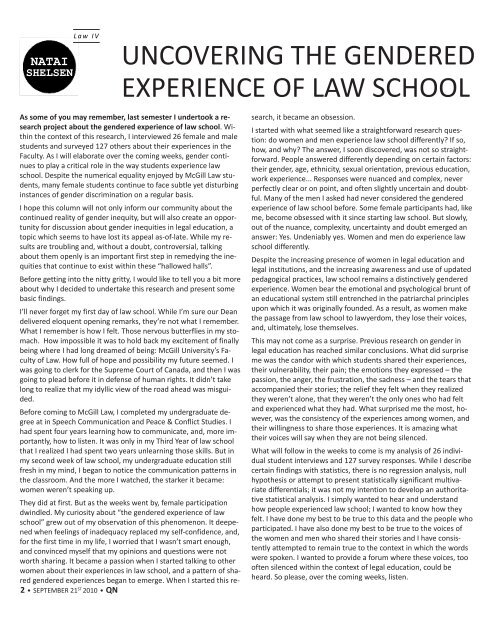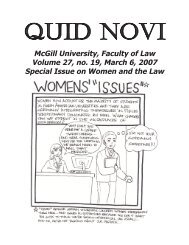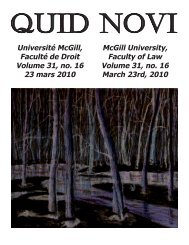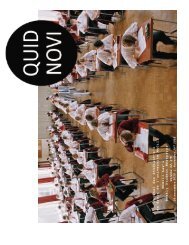September 21, 2010 - Latest Issue - McGill University
September 21, 2010 - Latest Issue - McGill University
September 21, 2010 - Latest Issue - McGill University
You also want an ePaper? Increase the reach of your titles
YUMPU automatically turns print PDFs into web optimized ePapers that Google loves.
NATAI<br />
SHELSEN<br />
L a w I V<br />
UNCOVERING THE GENDERED<br />
EXPERIENCE OF LAW SCHOOL<br />
As some of you may remember, last semester I undertook a research<br />
project about the gendered experience of law school. Within<br />
the context of this research, I interviewed 26 female and male<br />
students and surveyed 127 others about their experiences in the<br />
Faculty. As I will elaborate over the coming weeks, gender continues<br />
to play a critical role in the way students experience law<br />
school. Despite the numerical equality enjoyed by <strong>McGill</strong> Law students,<br />
many female students continue to face subtle yet disturbing<br />
instances of gender discrimination on a regular basis.<br />
I hope this column will not only inform our community about the<br />
continued reality of gender inequity, but will also create an opportunity<br />
for discussion about gender inequities in legal education, a<br />
topic which seems to have lost its appeal as-of-late. While my results<br />
are troubling and, without a doubt, controversial, talking<br />
about them openly is an important first step in remedying the inequities<br />
that continue to exist within these “hallowed halls”.<br />
Before getting into the nitty gritty, I would like to tell you a bit more<br />
about why I decided to undertake this research and present some<br />
basic findings.<br />
I’ll never forget my first day of law school. While I’m sure our Dean<br />
delivered eloquent opening remarks, they’re not what I remember.<br />
What I remember is how I felt. Those nervous butterflies in my stomach.<br />
How impossible it was to hold back my excitement of finally<br />
being where I had long dreamed of being: <strong>McGill</strong> <strong>University</strong>’s Faculty<br />
of Law. How full of hope and possibility my future seemed. I<br />
was going to clerk for the Supreme Court of Canada, and then I was<br />
going to plead before it in defense of human rights. It didn’t take<br />
long to realize that my idyllic view of the road ahead was misguided.<br />
Before coming to <strong>McGill</strong> Law, I completed my undergraduate degree<br />
at in Speech Communication and Peace & Conflict Studies. I<br />
had spent four years learning how to communicate, and, more importantly,<br />
how to listen. It was only in my Third Year of law school<br />
that I realized I had spent two years unlearning those skills. But in<br />
my second week of law school, my undergraduate education still<br />
fresh in my mind, I began to notice the communication patterns in<br />
the classroom. And the more I watched, the starker it became:<br />
women weren’t speaking up.<br />
They did at first. But as the weeks went by, female participation<br />
dwindled. My curiosity about “the gendered experience of law<br />
school” grew out of my observation of this phenomenon. It deepened<br />
when feelings of inadequacy replaced my self-confidence, and,<br />
for the first time in my life, I worried that I wasn’t smart enough,<br />
and convinced myself that my opinions and questions were not<br />
worth sharing. It became a passion when I started talking to other<br />
women about their experiences in law school, and a pattern of shared<br />
gendered experiences began to emerge. When I started this re-<br />
2 • SEPTEMBER <strong>21</strong> ST <strong>2010</strong> • QN<br />
search, it became an obsession.<br />
I started with what seemed like a straightforward research question:<br />
do women and men experience law school differently? If so,<br />
how, and why? The answer, I soon discovered, was not so straightforward.<br />
People answered differently depending on certain factors:<br />
their gender, age, ethnicity, sexual orientation, previous education,<br />
work experience... Responses were nuanced and complex, never<br />
perfectly clear or on point, and often slightly uncertain and doubtful.<br />
Many of the men I asked had never considered the gendered<br />
experience of law school before. Some female participants had, like<br />
me, become obsessed with it since starting law school. But slowly,<br />
out of the nuance, complexity, uncertainty and doubt emerged an<br />
answer: Yes. Undeniably yes. Women and men do experience law<br />
school differently.<br />
Despite the increasing presence of women in legal education and<br />
legal institutions, and the increasing awareness and use of updated<br />
pedagogical practices, law school remains a distinctively gendered<br />
experience. Women bear the emotional and psychological brunt of<br />
an educational system still entrenched in the patriarchal principles<br />
upon which it was originally founded. As a result, as women make<br />
the passage from law school to lawyerdom, they lose their voices,<br />
and, ultimately, lose themselves.<br />
This may not come as a surprise. Previous research on gender in<br />
legal education has reached similar conclusions. What did surprise<br />
me was the candor with which students shared their experiences,<br />
their vulnerability, their pain; the emotions they expressed – the<br />
passion, the anger, the frustration, the sadness – and the tears that<br />
accompanied their stories; the relief they felt when they realized<br />
they weren’t alone, that they weren’t the only ones who had felt<br />
and experienced what they had. What surprised me the most, however,<br />
was the consistency of the experiences among women, and<br />
their willingness to share those experiences. It is amazing what<br />
their voices will say when they are not being silenced.<br />
What will follow in the weeks to come is my analysis of 26 individual<br />
student interviews and 127 survey responses. While I describe<br />
certain findings with statistics, there is no regression analysis, null<br />
hypothesis or attempt to present statistically significant multivariate<br />
differentials; it was not my intention to develop an authoritative<br />
statistical analysis. I simply wanted to hear and understand<br />
how people experienced law school; I wanted to know how they<br />
felt. I have done my best to be true to this data and the people who<br />
participated. I have also done my best to be true to the voices of<br />
the women and men who shared their stories and I have consistently<br />
attempted to remain true to the context in which the words<br />
were spoken. I wanted to provide a forum where these voices, too<br />
often silenced within the context of legal education, could be<br />
heard. So please, over the coming weeks, listen.














